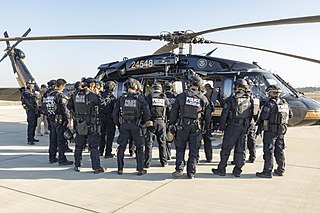
In the United States, a SWAT team is a generic term for a police tactical unit.

The Los Angeles Police Department (LAPD), officially known as the City of Los Angeles Police Department, is the primary law enforcement agency of Los Angeles, California, United States. With 8,832 officers and 3,000 civilian staff, it is the third-largest municipal police department in the United States, after the New York City Police Department and the Chicago Police Department.
Police Quest is a series of police simulation video games produced and published by Sierra On-Line between 1987 and 1998. The first five were adventure simulation games, the first three of which were designed by former police officer Jim Walls. The fourth to sixth titles were designed by former LAPD Chief Daryl F. Gates. Both SWAT and the real-time tactics game SWAT 2 still carried the Police Quest name and were numbered V and VI in the series, respectively, although subsequent titles in the series would drop the Police Quest title altogether and were rebranded as SWAT.

The Community Resources Against Street Hoodlums (CRASH) was a specialized gang intelligence unit of the Los Angeles Police Department (LAPD) tasked with combating gang-related crime between 1979 and 2000. The unit was established in the South Central district of Los Angeles, California, United States, to combat rising gang violence during the period. Each of the LAPD's 18 divisions had a CRASH unit assigned to it, whose primary goal was to suppress gang-related crimes in the city, which came about primarily from the increase in illegal drug trade.

Daryl Francis Gates was an American police officer who served as chief of the Los Angeles Police Department from 1978 to 1992. His length of tenure in this position was second only to that of William H. Parker. Gates is credited with the creation of SWAT teams alongside fellow Los Angeles Police Department (LAPD) officer John Nelson, who others claim was the originator of SWAT in 1965. Gates also co-founded the Drug Abuse Resistance Education program.

SWAT 3: Close Quarters Battle is a 1999 tactical first-person shooter video game developed by Sierra Northwest and published by Sierra Entertainment exclusively for Microsoft Windows. It is the seventh installment of the Police Quest series and the third installment in the SWAT subseries. Set in the then-future year of 2005, the game follows the Los Angeles Police Department (LAPD) Metropolitan Division SWAT unit as they combat a wave of violent crime and terrorism in Los Angeles in the lead-up to a nuclear disarmament treaty signing.

Die Hard: Vendetta is a 2002 first-person shooter video game developed by Bits Studios and published by Fox Interactive and Vivendi Universal Games for the GameCube. It was later released for the PlayStation 2 and Xbox only in Europe in 2003. Taking place after the first three Die Hard films, players take on terrorists as John McClane. Reginald VelJohnson reprises his role as Sgt. Al Powell. McClane's daughter, Lucy, is an L.A.P.D. member in the game. The game received mixed reviews from critics.
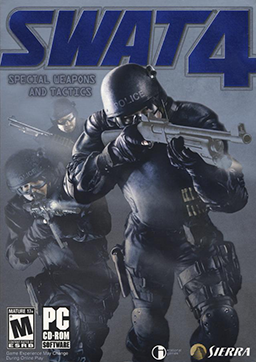
SWAT 4 is a 2005 tactical first-person shooter video game developed by Irrational Games and published by Sierra Entertainment exclusively for Microsoft Windows. It is the ninth installment in the Police Quest series and the fourth installment in the SWAT subseries. In SWAT 4, the player commands a police SWAT team in the city of Fairview, New York. Unlike its predecessor, SWAT 3: Close Quarters Battle, SWAT 4 does not have an overarching plot. Instead, gameplay takes place over a series of mostly unconnected deployments of the player's SWAT team, as they are sent to apprehend criminals, terrorists, gangs, and cults in and around Fairview.
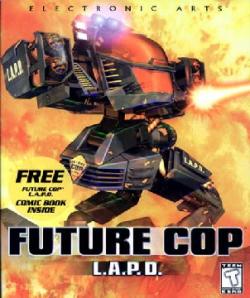
Future Cop: LAPD is a third-person shooter developed by EA Redwood Shores and published by Electronic Arts and released first for the PlayStation, then Mac OS and Windows. Future Cop was originally developed as an installment of the Strike series.

Police Quest: Open Season is a 1993 police procedural point-and-click adventure video game developed and published by Sierra On-Line. It is the fourth installment in the Police Quest series. Departing from the fictional setting of Lytton, California from the first three installments, Open Season follows police detective John Carey as he investigates a series of brutal murders in Los Angeles.

LAPD: Life on the Beat is an American reality television series that follows officers of the Los Angeles Police Department, as they respond to various incidents within their precincts' jurisdiction. The program aired in first-run syndication from September 11, 1995, to September 10, 1999. Like its contemporary, COPS, LAPD follows police officers on patrol and during investigations. Unlike COPS, Life on the Beat only features police officers from the Los Angeles Police Department (LAPD). The series was originally titled as simply LAPD for its first season in 1995, before adopting the expanded title in 1996, in conjunction with the introduction of an upgraded graphical look.

Police Quest III: The Kindred is a 1991 police procedural point-and-click adventure video game developed and published by Jim Walls and Sierra On-Line. It is the third installment in the Police Quest series. The game finishes the story of police officer Sonny Bonds, who seeks revenge after his wife is attacked by an unknown assailant.

SWAT: Target Liberty is a 2007 tactical shooter video game developed by 3G Studios and published by Vivendi Games exclusively for the PlayStation Portable.

Metropolitan Division, commonly referred to as Metro Division or just Metro, is an elite division of the Los Angeles Police Department (LAPD) under its Special Operations Group. Metropolitan Division is responsible for managing the LAPD's specialized crime suppression, K-9, mounted, and SWAT units, named "platoons".
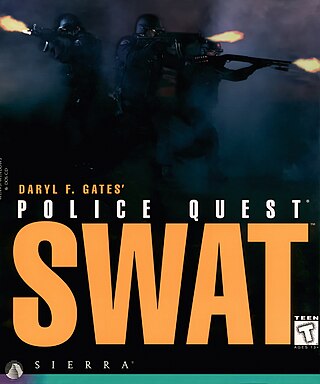
Police Quest: SWAT, alternatively known as Daryl F. Gates' Police Quest: SWAT or Police Quest 5: SWAT, is a 1995 graphic adventure educational video game developed and published by Sierra On-Line for DOS, Microsoft Windows, and Mac OS. It is the fifth installment in the Police Quest series and the first installment in the SWAT subseries. The game follows a Los Angeles Police Department (LAPD) Metropolitan Division SWAT team as they train to handle high-risk criminal incidents across Los Angeles.

SWAT: Global Strike Team is a 2003 tactical shooter video game developed by Argonaut Games and published by Vivendi Universal Games for the PlayStation 2 and Xbox. It featured a new game engine developed by Argonaut developed to push the lighting capabilities of the Xbox and was the first SWAT game to ship on console systems. The game was inspired by the strategic elements of SWAT 3 with the instantly accessible arcade action of the Virtua Cop series.
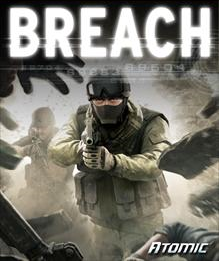
Breach is a team-based first-person shooter multiplayer video game, developed by Atomic Games and was released for Windows PCs and the Xbox 360. Breach was distributed online for the Xbox 360 by Xbox Live Arcade, and on Windows by Steam. It features dynamic destructible environments and a cover system.

S.W.A.T. is an American police procedural action crime drama television series created by Robert Hamner, developed by Rick Husky, and produced by Hamner, Aaron Spelling, and Leonard Goldberg under Spelling-Goldberg Productions. The series aired for two seasons on ABC from February 1975 to April 1976. A spin-off of The Rookies, developed from a two-part pilot aired on February 17, 1975, S.W.A.T. follows a police Special Weapons and Tactics (SWAT) team operating in an unnamed Californian city. The series stars Steve Forrest, Robert Urich, Rod Perry, Mark Shera, and James Coleman as the titular team's officers.

The militarization of police is the use of military equipment and tactics by law enforcement officers. This includes the use of armored personnel carriers (APCs), assault rifles, submachine guns, flashbang grenades, sniper rifles, and SWAT teams. The militarization of law enforcement is also associated with intelligence agency–style information gathering aimed at the public and political activists and with a more aggressive style of law enforcement. Criminal justice professor Peter Kraska has defined militarization of police as "the process whereby civilian police increasingly draw from, and pattern themselves around, the tenets of militarism and the military model".
S.W.A.T. is an American police procedural action drama television series, based on the 1975 television series and the 2003 film adaptation of the same name. Aaron Rahsaan Thomas and Shawn Ryan developed the new series, which premiered on CBS on November 2, 2017, and is produced by Original Film, CBS Studios and Sony Pictures Television. In April 2022, the series was renewed for a sixth season which premiered on October 7, 2022. In May 2023, the series was canceled after six seasons at CBS, only to be renewed for a seventh and final season at CBS a few days later. The seventh season premiered on February 16, 2024. In April 2024, the final season decision was reversed and the show was renewed for an eighth season. The eighth season premiered on October 18, 2024.




















